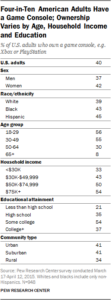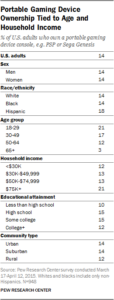Recently the Pew Research Center performed a survey on the United States populace in order to determine the type of electronic devices that people own. This could be phones, tablets, computers, and MP3 players, as well as video games.
These surveys are put out quite often and data is used both on the market and by private groups for various purposes. Shockingly the results of this survey show a somewhat miraculous trend, stating that the majority of video game console owners are, in fact, women.
If true, these startling findings could lead researchers and marketers to believe that women are a vastly untapped market. However, there is a reason to doubt this conclusion.
While this survey does have many applications and, when used correctly, can provide a better image of the market at large, many problems can arise when uninformed individuals start to make assumptions about the data.
Consider the first question about video games: Do you own a Video Game Console? This could be interpreted in many different ways, especially when you see that many older individuals “own” video games systems.
Some would assume that because a person “owns” a video game console that they are an active player, when it is just as likely that they have a video game console in their house and their children play it. I know my mother owned several consoles, however it was my brother and I that typically would play them.
By not specifying if the owners used the system, or asked questions about the purpose of the device (because, let’s face it, consoles can make a great Netflix machine) the consumer, marketer, and activist cannot truly understand the face of modern gaming as a whole.
This wasn’t the only problem with the results of this survey. Consider their findings on portable gaming ownership. For their examples of portable systems it gives the PlayStation Portable and the Sega Genesis game player, which I assume means the Sega Nomad, and not the 1989 console.
With the former being a last generation handheld and the latter a relatively obscure system, it leads me to believe that the researchers may be out of touch with the current handheld video game market.
The reason for this article is to give a counterbalance to the ideas represented in many articles on various mainstream websites claiming that women are the new audience of gaming. The simple answer given by this survey is that while it is a possibility that quite a bit more women are buying video game systems for their own enjoyment, there are many different conclusions that could be drawn by this research that shouldn’t be discounted.
When the questions are as vague as who owns a video game console, any conclusion drawn should be with a skeptical eye and an understanding that there may be multiple meanings behind it.


